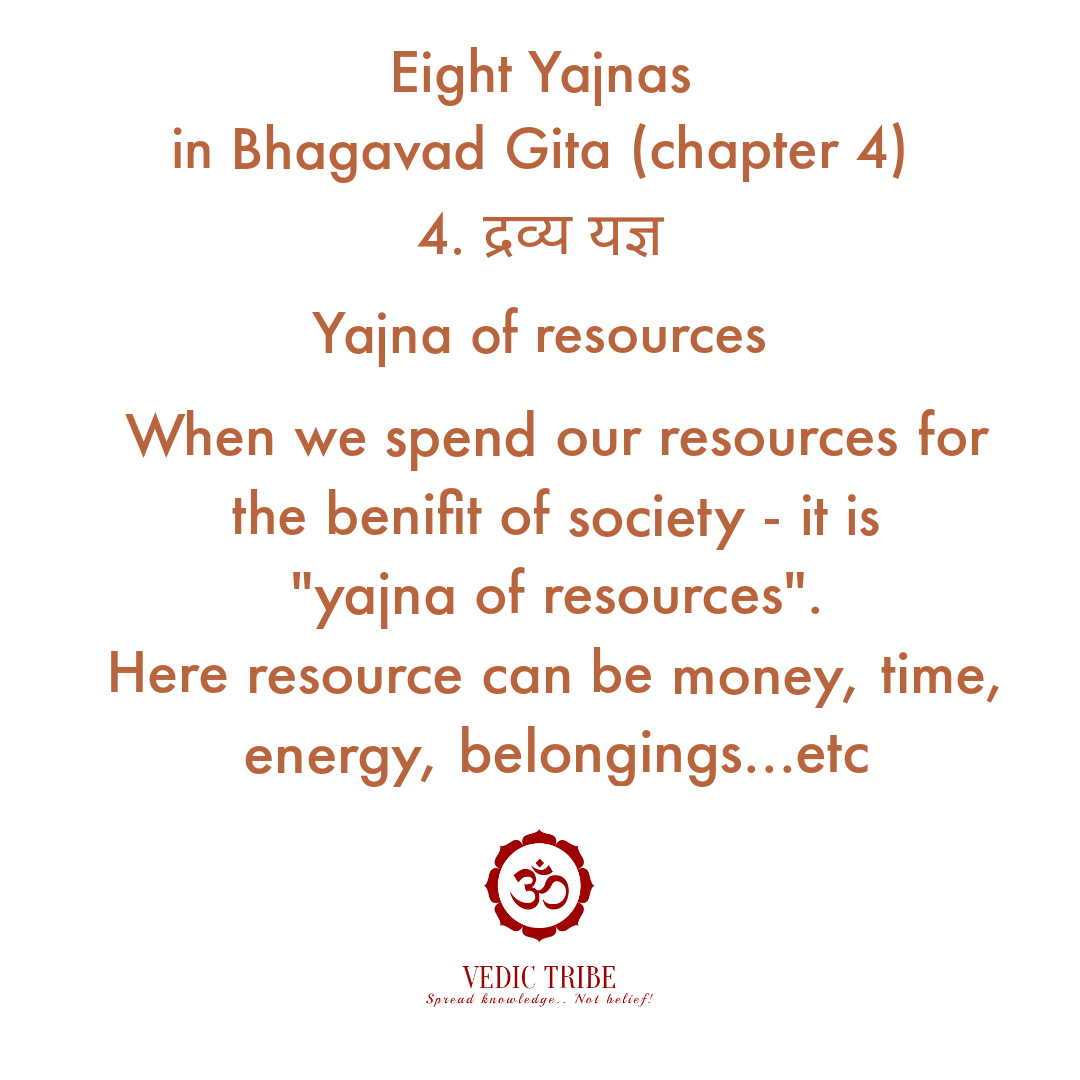What is Yajna?
Is it a ritual for sacrificing animals?
Is it worship of deities who are the order of this cosmos?
Is it a mega social gathering intended for distribution of wealth?
Yes to all the above.
Westerners only highlight - the remote aspect of animal sacrifice.
But vedic people highlight - worship, gathering & distribution of wealth.
Krishna revolutionized the concept of Yajna in Bhagavad Gita.
Krishna said - every action can be Yajna and lists out eight such Yajnas for every commoner.
We are happy to share these "commoner's yajna" which can be performed by everyone - as part of daily routine.
Practice of these eight yajnas - elevates our consciousness and develops our mental & spiritual well-being.
All the best!!
Madhwesh K
Vedic Tribe
---
Can gratification of senses be a Yajna?
Yes. Krishna calls this इंद्रिय यज्ञ (indriya yajna).
Both consciously & unconsciously we are always gratifying our senses.
We can consciously offer all our gratifications to Brahman via our senses. This becomes Yajna of Senses.
This requires little mindfulness while consuming.
While eating, if you eat tasty food - take a second pause and offer your enjoyment to Brahman.
If you listen to music that moves you - take a pause and offer your enjoyment to Brahman.
This can be done for all sensual gratifications.
Advance spiritual practioners - offer every sensual experience to Brahman; not only enjoyments.
For beginners, "Yajna of Senses" not only creates "mindfulness in consumption" but also helps advance spiritual journey.
All the best.
Madhwesh K
Vedic Tribe
---
Can *restraint* on gratification be a Yajna?
Yes. Krishna calls this संयम यज्ञ (samyama yajna).
Without restraint, there is no progress in the inward journey. Because, our focus is diluted by over-gratification of senses.
Deliberate practice of restraint - increases our focus on the inward journey.
This, however, demands a strong will.
To exercise restraint on (mobile) screentime, you can use "digital wellbeing apps".
To exercise restraint on junk food, you can take a ritual-stance.
This can be done for all sensual gratifications.
Advance spiritual practitioners - conduct severe austerities to exercise restraint.
For beginners, "Yajna of Restraint" not only creates "physical health" but also helps advance spiritual journey.
All the best.
Madhwesh K
Vedic Tribe
---
Our body has an in-built "reward system".
When we consume via our senses, our survival is taken care and the "reward system" responds by giving us pleasure.
Senses always seek pleasure and compulsively move outwards. This is the reason why most of us find it difficult to turn the senses inwards.
Once they are turned inward, next challenge is to engage them in the mind itself. This is offering of senses in the fire of mind. Krishna calls it "Yajna of Mind"!!
This can be achieved by practicing simple yogic mindfulness techniques.
All the best!!
Madhwesh K
Vedic Tribe
---
Can "distribution of resources" be Yajna?Yes.
Money is not the only resource - that we can distribute to society. We can give our time, our knowledge, our skills...etc for betterment of the society. All these are resources.
When we use these resources for the betterment of society we conduct "Yajna of Resources".
There are people who have done "sarvasva dana" (distributing their entire belongings) more than once in their lifetime. They are models for commoners to contribute to the society.
Krishna calls this "dravya yajna"
All the best!!
Madhwesh K
Vedic Tribe
---
Can austerities be Yajna?
Yes.
Austerities creates self-control and boosts self-esteem. This in turn creates physical & mental health.
When one takes a vow to engage in austerities - it is called "vrata". When vrata is done to connect with Brahman, it becomes Bhagavat-Vrata or Bhagavata-Dharma.
Krishna calls this "thapo yajna"! (Of course, thapa is more than austerities)
But how can we move from rampant consumption to austerities?
You can use a mental tool called "ritual stance". By adopting certain ritual stances, one can perform austerities.
"In the morning, i will check my mobile only after - exercise, shower & Pooja" - this is an example of ritual-stance. This goes a long way in creating physical, mental & spiritual health.
All the best!
Madhwesh K
Vedic Tribe
---
Can yogic practices be Yajna?
Yes.
Yoga School of Thought propogates a methodology called Ashtanga Yoga (eight limbed yoga): yamas (abstinences), niyama (observances), asana (postures), pranayama (breathing), pratyahara (withdrawal), dharana (concentration), dhyana (meditation) and samadhi (absorption).
First four limbs are external practices and next four are internal practices.
First four are relatively easy, the next four requires dedication.
Krishna calls this "yoga yajna"!
All the best!
Madhwesh K
Vedic Tribe
---
Can study of Shastras be Yajna?
Yes.
Experience of sages were composed in Veda Mantras. With time, the understanding became difficult for the commoner. So, sages & the learned diluted vedic literature and made them easy for commoners.
The literature consists of Shrutis (vedic mantras), smritis (law & conduct), Vedangas (grammar...etc), darshanas (philosophical enquiry), tantra (esoteric tradition), puranas (prehistory)...etc. They can be grossly called Shastras.
Systematic study of Shastras gives us access to the experience of the sages & the learned.
Krishna calls this "swadhya yajna"!
All the best!
Madhwesh K
Vedic Tribe
---
Can "pranayama" be Yajna?
Yes.
Ten dimensions of air inside our body are called: prana, apana, samana, udana, vyana, naga, kurma, krkara, devadatta and Dhananjaya.
Prana & apana push & pull each other. The Yoga practitioner combines these two - by practicing Pranayama. This is the highest level of Pranayama.
Control of breathing invariably enables control of fluctuations of mind!
Krishana calls this- Yajna of Pranayama
This completes our series on "Eight Yajnas in Bhagavad Gita"(chapter 4). It may be noted that Bhagavad Gita tells many more Yajnas and also - how to internalize them. We only covered chapter 4. Also, Bhagavad Gita is an ocean of knowledge and we hope that we inspire people to read it from source & internalize it!
All the best.
Madhwesh K
Vedic Tribe









No comments:
Post a Comment